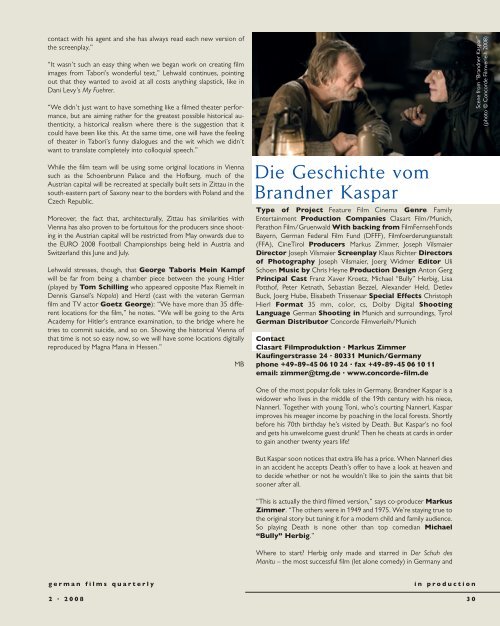Quarterly 2 · 2008 - German Films
Quarterly 2 · 2008 - German Films
Quarterly 2 · 2008 - German Films
You also want an ePaper? Increase the reach of your titles
YUMPU automatically turns print PDFs into web optimized ePapers that Google loves.
contact with his agent and she has always read each new version of<br />
the screenplay.”<br />
“It wasn’t such an easy thing when we began work on creating film<br />
images from Tabori’s wonderful text,” Lehwald continues, pointing<br />
out that they wanted to avoid at all costs anything slapstick, like in<br />
Dani Levy’s My Fuehrer.<br />
“We didn’t just want to have something like a filmed theater performance,<br />
but are aiming rather for the greatest possible historical au -<br />
thenti city, a historical realism where there is the suggestion that it<br />
could have been like this. At the same time, one will have the feeling<br />
of theater in Tabori’s funny dialogues and the wit which we didn’t<br />
want to translate completely into colloquial speech.”<br />
While the film team will be using some original locations in Vienna<br />
such as the Schoenbrunn Palace and the Hofburg, much of the<br />
Austrian capital will be recreated at specially built sets in Zittau in the<br />
south-eastern part of Saxony near to the borders with Poland and the<br />
Czech Republic.<br />
Moreover, the fact that, architecturally, Zittau has similarities with<br />
Vienna has also proven to be fortuitous for the producers since shoot -<br />
ing in the Austrian capital will be restricted from May onwards due to<br />
the EURO <strong>2008</strong> Football Championships being held in Austria and<br />
Switzerland this June and July.<br />
Lehwald stresses, though, that George Taboris Mein Kampf<br />
will be far from being a chamber piece between the young Hitler<br />
(played by Tom Schilling who appeared opposite Max Riemelt in<br />
Dennis Gansel’s Napola) and Herzl (cast with the veteran <strong>German</strong><br />
film and TV actor Goetz George): “We have more than 35 different<br />
locations for the film,” he notes. “We will be going to the Arts<br />
Academy for Hitler’s entrance examination, to the bridge where he<br />
tries to commit suicide, and so on. Showing the historical Vienna of<br />
that time is not so easy now, so we will have some locations digitally<br />
reproduced by Magna Mana in Hessen.”<br />
MB<br />
Die Geschichte vom<br />
Brandner Kaspar<br />
Type of Project Feature Film Cinema Genre Family<br />
Entertainment Production Companies Clasart Film/Munich,<br />
Perathon Film/Gruenwald With backing from FilmFernsehFonds<br />
Bayern, <strong>German</strong> Federal Film Fund (DFFF), Filmfoerderungsanstalt<br />
(FFA), CineTirol Producers Markus Zimmer, Joseph Vilsmaier<br />
Director Joseph Vilsmaier Screenplay Klaus Richter Directors<br />
of Photography Joseph Vilsmaier, Joerg Widmer Editor Uli<br />
Schoen Music by Chris Heyne Production Design Anton Gerg<br />
Principal Cast Franz Xaver Kroetz, Michael “Bully” Herbig, Lisa<br />
Potthof, Peter Ketnath, Sebastian Bezzel, Alexander Held, Detlev<br />
Buck, Joerg Hube, Elisabeth Trissenaar Special Effects Christoph<br />
Hierl Format 35 mm, color, cs, Dolby Digital Shooting<br />
Language <strong>German</strong> Shooting in Munich and surroundings, Tyrol<br />
<strong>German</strong> Distributor Concorde Filmverleih/Munich<br />
Contact<br />
Clasart Filmproduktion <strong>·</strong> Markus Zimmer<br />
Kaufingerstrasse 24 <strong>·</strong> 80331 Munich/<strong>German</strong>y<br />
phone +49-89-45 06 10 24 <strong>·</strong> fax +49-89-45 06 10 11<br />
email: zimmer@tmg.de <strong>·</strong> www.concorde-film.de<br />
One of the most popular folk tales in <strong>German</strong>y, Brandner Kaspar is a<br />
widower who lives in the middle of the 19th century with his niece,<br />
Nannerl. Together with young Toni, who’s courting Nannerl, Kaspar<br />
improves his meager income by poaching in the local forests. Shortly<br />
before his 70th birthday he’s visited by Death. But Kaspar’s no fool<br />
and gets his unwelcome guest drunk! Then he cheats at cards in order<br />
to gain another twenty years life!<br />
But Kaspar soon notices that extra life has a price. When Nannerl dies<br />
in an accident he accepts Death’s offer to have a look at heaven and<br />
to decide whether or not he wouldn’t like to join the saints that bit<br />
sooner after all.<br />
“This is actually the third filmed version,” says co-producer Markus<br />
Zimmer. “The others were in 1949 and 1975. We’re staying true to<br />
the original story but tuning it for a modern child and family audience.<br />
So playing Death is none other than top comedian Michael<br />
“Bully” Herbig.”<br />
Where to start? Herbig only made and starred in Der Schuh des<br />
Manitu – the most successful film (let alone comedy) in <strong>German</strong>y and<br />
german films quarterly in production<br />
2 <strong>·</strong> <strong>2008</strong> 30<br />
Scene from “Brandner Kaspar”<br />
(photo © Concorde Filmverleih <strong>2008</strong>)

















